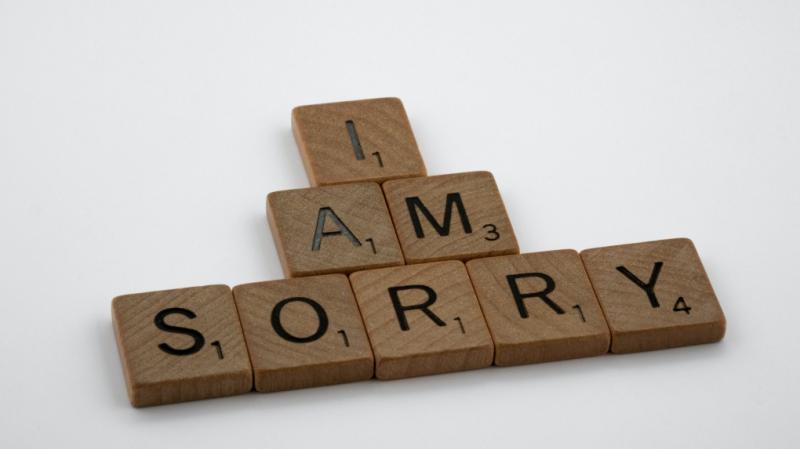The art of apology and 13 words you shouldn't say after 'sorry'
By: Mitchell Consky CTV (Canada Television News_
BUZZ NOTE: There is a video of an interview with the authors of the book that can be watched by clicking on the SEEDED CONTENT link just below this message, which will take you to the original source article. You may have to bear 30 seconds of ads first, but the content is pretty well covered by the text below.

The art of apology and 13 words you shouldn't say after 'sorry'

The art of apology includes saying the words "I'm sorry" or "I apologize," says authors of new book 'Sorry, Sorry, Sorry.' (Pexels/ Brett Jordan)
A new book aims to demystify the process of delivering honest apologies.
Authors Marjorie Ingall and Susan McCarthy have been studying the intricacies of good and bad apologies in news, politics and literature since 2012.
Their new book, Sorry, Sorry, Sorry: The Case for Good Apologies , draws on a deep well of research in sociology, psychology, law, and medicine, breaking down the art of apologizing.
“You have to use the words, ‘I’m sorry’ or I ‘apologize,’” Ingall told CTV’s Your Morning Monday, referring to the first crucial step in any good apology. “Seems obvious. It isn’t. Do not say, ‘I regret.’ That’s about you. Do not say, ‘I’d like to apologize.’ Just do it.”
Ingall added that the next step comes down to specific acknowledgment.
“You can’t just say sorry ‘for the situation,’ or ‘for that regrettable thing last week,’ she explained. “Show that you understand why what you did was harmful.”
Co-author McCarthy told CTV’s Your Morning that it’s important to explain a personal understanding of the impact you caused, and not to make excuses.
“Don’t say, ‘I’m sorry, but you were being very annoying,” she said.
The authors added that it’s important to clarify why the same mistake won’t be made again.
“If you could make reparations,” Ingall said, “make reparations.”
“It could be as simple as: you’re wearing this beautiful white suit. If I spill coffee on it, I offer to pay for the dry cleaning. It could be something involving a donation to a favourite charity,” Ingall explained.
“Show the steps you’re taking to ensure you will not do this again.”
The book features a list of thirteen words that do not belong in an apology. Those words are:
- Obviously
- Regrettable
- Already
- Dialogue
- Alleged
- Positivity
- Jesus
- Journey
- Self-discovery
- If
- But
- Context
- Unfortunate
The authors also spoke about what to do if you’re receiving an apology, but don’t feel willing to accept it.
“You could say, ‘Thank you I need to think about that,’” McCarthy explained. “You could say, ‘I need to sit with that.’ You could say, ‘You know you apologized for spilling the coffee, but you didn’t apologize for dancing on the table and breaking the dishes. You could redirect it. You could say I didn’t get the apology for the thing that really upset me.”
Despite the complex terrain of delivering and receiving apologies, Ingall said it’s never too late.
“People often [say], ‘well it happened five years ago.’ If you’re still thinking about it, then you’ll probably feel better if you apologize for this thing that has been weighing on you.”
She added that research has shown that a ‘too-quick’ apology isn’t as accepted as one that is a little bit delayed because “people haven’t had the time to sit and think with it.”
McCarthy added that, sometimes, “you accept an inferior apology just because it’s so great to get it.”
“Apologies are mandatory,” Ingall said. “Accepting the apology is not.”










Comments are subject to this group's RED BOX RULES which can be accessed by clicking on this link -> or by clicking on this group's avatar at the top right of the article page above, either of which will open this group's home page.
Maybe this should be required reading in order for some members of social news sites who tend to get many flags posted on their comments followed by their bitching about the moderation.
An insincere apology only serves to make things worse.